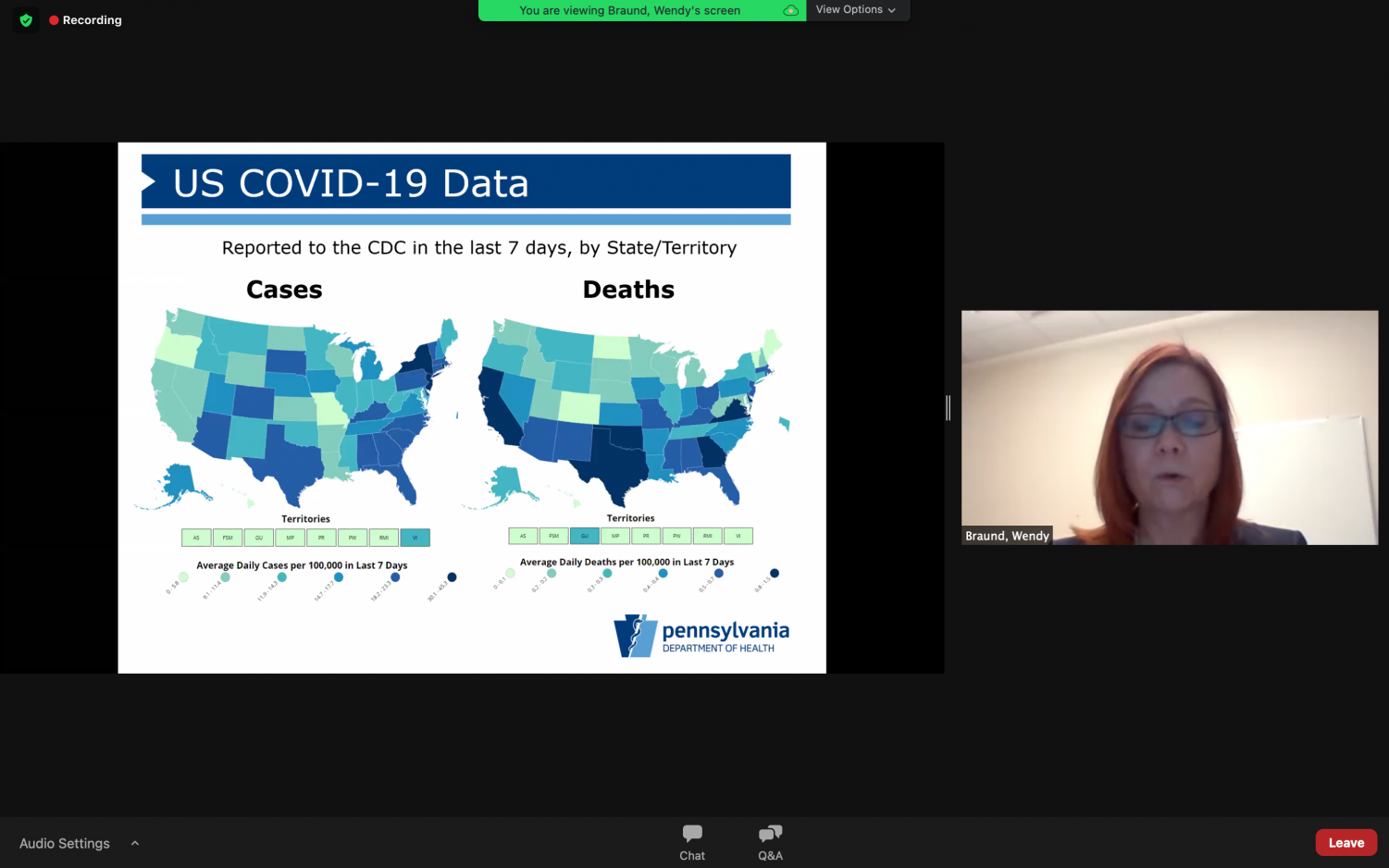Pennsylvania’s top doctor addresses state’s COVID-19 response


Wendy Braund, the COVID-19 response director and interim acting physician general at the Pennsylvania Department of Health, led a conversation on Wednesday via Zoom called “Pennsylvania State Response to COVID-19.” The event — hosted by the Graduate School of Public Health — focused on the state’s testing and vaccination efforts.
Wendy Braund urged on Wednesday that Pennsylvanians get a COVID-19 vaccine as soon as they get the chance.
Braund, the COVID-19 response director and interim acting physician general at the Pennsylvania Department of Health, said people should take the first available shot — regardless of the label. The Food and Drug Administration has authorized three different COVID-19 vaccines for emergency use — Pfizer, Moderna and Johnson & Johnson.
“Although there are differences in efficacy among the three [vaccines] as you can see, all three are amazingly effective, and all three 100% effective against hospitalization and death,” Braund said. “So really, people should get the first vaccine available as soon as they are eligible.”
Braund led a conversation on Wednesday via Zoom called “Pennsylvania State Response to COVID-19.” The event — hosted by the Graduate School of Public Health — focused on the state’s testing and vaccination efforts. It was a part of the School’s “Essentials of Public Health” course, although it was open to all students. Jeremy Martinson — an assistant professor of infectious diseases and microbiology, as well as the course instructor — gave an introduction and moderated the question and answer portion of the event.
Since the start of the pandemic, Pennsylvania has had more than 950,000 coronavirus cases and 24,000 deaths, according to the Pennsylvania Department of Health. The Department also reported that there have been more than 3.2 million vaccine doses administered. According to the New York Times, 19.8% of Pennsylvanians have been given one shot of the vaccine, and 9.4% have been fully vaccinated.
Braund said the health department is creating a “communications campaign” to help deliver vaccinations to underserved communities.
“We are developing a communications campaign, and we’ll be working with trusted messengers in underserved communities to ensure that all Pennsylvanians who wish to be vaccinated will be vaccinated,” Braun said. “And obviously, to continue to serve our vulnerable populations.”
But Braund said even with the increasing clip of vaccinations, it’s still important to practice proper mitigation behaviors such as wearing masks, washing hands regularly and social distancing to stop the spread of the virus.
“There are three key sets of strategies to treat … a pandemic — containment, mitigation and medical countermeasures,” Braund said. “So we will use those three buckets of strategies to examine Pennsylvania’s response, and compare it to some elements of the national response.
Braund also addressed COVID-19 variants. There are currently three major variants spreading globally — B.1.1.7, B.1.351 and P.1, according to the Centers for Disease Control and Prevention. In Pennsylvania, there are currently 67 cases of the B.1.1.7 variant, one case of the B.1.351 variant and none of the P.1 variant.
“These variants do seem to spread more easily and quickly, which of course may lead to more cases in COVID, which could cause more strain on the health care system and lead to more hospitalization and potentially more deaths,” Braund said. “So it’s certainly concerning.”
But she said the “good news” in that studies suggest the antibodies produced from COVID-19 vaccinations — from all three of the FDA approved vaccines — recognize the variants. She added that the Department of Health is “closely [watching]” the variants.
After Braund’s presentation, the floor was open for questions from the audience. Daniel Lane, a first-year doctoral student in infectious disease and microbiology, asked about how hospitals are preparing for future pandemics.
“It is clear from the past peak that hospitals are ill-equipped to respond to large numbers of people coming in at once,” Lane said. “Are there plans in place to address this at the state level? Is this something that would be too expensive to maintain long term in the way of preparedness for the next pandemic?”
In response, Braund said the health department is considering efforts to better prepare hospitals for the future, such as equipping them with the “right” amount of PPE, cross-training staff and sharing resources across facilities.
“The hospitals were unprepared,” Braund said. “And so we really have been working with them to make sure that they will be prepared in the future.”
Other students were curious about the possibility of more permanent mask mandates. Keaton Solo, a doctoral student in human genetics, asked Braun if “mask mandates will or should become more of a normalcy.”
Braund said in response that flu cases have dropped due to mandates and mitigations put in place as a result of COVID-19. Flu case numbers were “unusually low” as of Feb. 27, according to the CDC. Braund said she can picture wearing masks during the flu season as a potential “new normal.”
“We’ve seen the flu activity in the state is way below normal. It’s below normal across the country, and there was no flu season in South America,” Braund said. “And we know that’s directly related to all of the hygiene and the masking and the social distancing. All those things passed the flu virus just like they passed COVID.”
Braund added that as vaccines continue to roll out, the state will begin to shift from pandemic response to “recovery” and “building resiliency.”
“Truly, no part of life as we knew remains untouched by COVID,” Braund said.
Recent Posts
Opinion | School should be in the summer
Although this may be controversial, I believe that from this data, it is evident that…
Weathering the storm: Pittsburgh teams have tackled some of the toughest environments
The end of the year in western Pennsylvania is always marked by two things —…
Notes From an Average Girl // Notes on Book Banning
In this edition of Notes From an Average Girl, senior staff writer Madeline Milchman writes…
To Be Honest // Yup, it is that damn phone
In this edition of To Be Honest, staff writer Evin Verbrugge writes about her phone…
Meaning at the Movies | Portraying Toxic ‘Adolescence’
In this edition of Meaning at the Movies, staff writer Lauren Deaton explores the mini-series…
Opinion | Climate change requires radical, immediate action
Contributing editor Emma Hannan talks about the effects of climate change and the actions cities…


